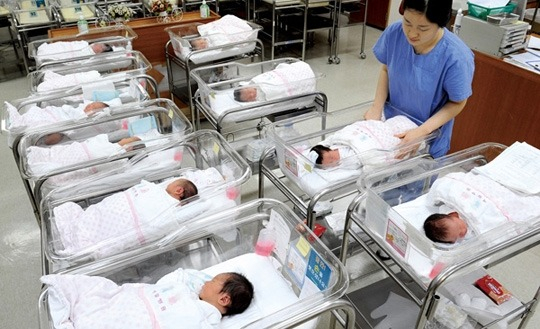S.Korean newly married couplesŌĆÖ birth rate at record low
The UN expects the S.Korean population to drop 11.7% by 2050, slashing the working-age population 34.8%, GDP by 28.4%
By Dec 11, 2023 (Gmt+09:00)
S.Korea's LS Materials set to boost earnings ahead of IPO process


Hankook Tire buys $1 bn Hanon Systems stake from Hahn & Co.


Samsung Heavy Industries succeeds autonomous vessel navigation


NPS to hike risky asset purchases under simplified allocation system


JapanŌĆÖs request for Naver to shed Line control ŌĆśunprecedented': CEO



South KoreaŌĆÖs fertility rate among newly married couples, who account for most of the countryŌĆÖs newborns, hit a trough last year, adding to concerns over worsening labor shortages due to the low birthrate and aging in AsiaŌĆÖs fourth-largest economy.
The fertility rate of couples in their first marriages for five years or less as of Nov. 1, 2022, fell to an all-time low of 0.65, Statistics Korea said on Monday. The rate has been declining since 2015 when the statistics office started compiling the data.
It is also taking longer for such couples to produce offspring. Newly married husbands and wives spent an average of 17.9 months to have their first baby, the longest of the years recorded, according to the data. It took 15 months in 2015 and 16.1 months in 2019.
Those couples without children accounted for a record high of 46.4% of the total, up 0.6 percentage point, while those couples with one child or more fell to 53.6%.
The number of newlyweds fell to an all-time low of 1.03 million with steady drops from 1.47 million in 2015.
ŌĆ£The decline of couples in their first marriages of five years or less, who account for more than 80% of newborns a year, directly affects the population,ŌĆØ said Lee Sang-Lim, a research fellow at the Center for Population Monitoring and Assessment of the Korea Institute for Health and Social Affairs.
ŌĆ£We need to improve the working environment and reform the labor system for work-family balance to create an environment in which newlyweds can have children.ŌĆØ
DINK
Couples with two incomes in their first marriages of five years or less reached a record high amid an economic slowdown.
Dual-income families accounted for 57.2% of those couples last year, up 2.3 percentage points from 2021, according to the statistics office. The rate has been steadily growing from 42.9% in 2015, exceeding the 50% level in 2020.
Households with "double income, no kids" (DINK) made up 50.2% in 2022, staying above half for a second straight year with 50.4% the previous year. Couples with double incomes had only 0.54 child on average, lower than the 0.73 of households with single incomes.
Home ownership also had an impact on the birth rate. Among the total couples in their first marriages for five years or less who owned homes, only 49.5% had children, 10.1 percentage points lower than couples with children.
FURTHER DROP
South KoreaŌĆÖs total fertility rate also hit a trough of 0.7 in the third quarter of this year, matching the record in the previous three months. The rate is expected to fall below this record level in the fourth quarter.
Given such a low birth rate, the countryŌĆÖs population was forecast to drop 11.7% to 45.77 million in 2050 from 51.81 million in 2022, according to the United Nations.
The nationŌĆÖs working-age population was predicted to drop 34.8% to 23.98 million during the period, slashing its gross domestic product by 28.4%, the intergovernmental organization said.

The government is trying to boost birth rates but additional measures such as those facilitating more immigration are necessary to change the trend, experts said.
South Korea is set to raise its visa quota for non-professional foreign workers to a record high and expand the sectors in which they can work.
Write to Se-Min Huh, Kyung-Min Kang and Sang-yong Park at semin@hankyung.com
┬Ā
Jongwoo Cheon edited this article.
-
 EconomyKorea to raise unskilled foreign worker visa quota to record high
EconomyKorea to raise unskilled foreign worker visa quota to record highNov 27, 2023 (Gmt+09:00)
3 Min read -
 EconomyS.KoreaŌĆÖs birth rate at record low despite rebound in marriages
EconomyS.KoreaŌĆÖs birth rate at record low despite rebound in marriagesAug 30, 2023 (Gmt+09:00)
2 Min read -

-
 EconomyS.Korea mulls adding national pension benefits to raise birth rate
EconomyS.Korea mulls adding national pension benefits to raise birth rateMay 31, 2023 (Gmt+09:00)
1 Min read -
 EconomySeoul to lower bar for multi-child family subsidies to raise birth rate
EconomySeoul to lower bar for multi-child family subsidies to raise birth rateMay 16, 2023 (Gmt+09:00)
1 Min read -
 EconomyS.Korea to see 240K drop in number of manufacturing workers by 2032
EconomyS.Korea to see 240K drop in number of manufacturing workers by 2032May 10, 2023 (Gmt+09:00)
2 Min read -
 EconomyS.KoreaŌĆÖs birth rate decline accelerates to worldŌĆÖs lowest
EconomyS.KoreaŌĆÖs birth rate decline accelerates to worldŌĆÖs lowestFeb 25, 2021 (Gmt+09:00)
4 Min read


